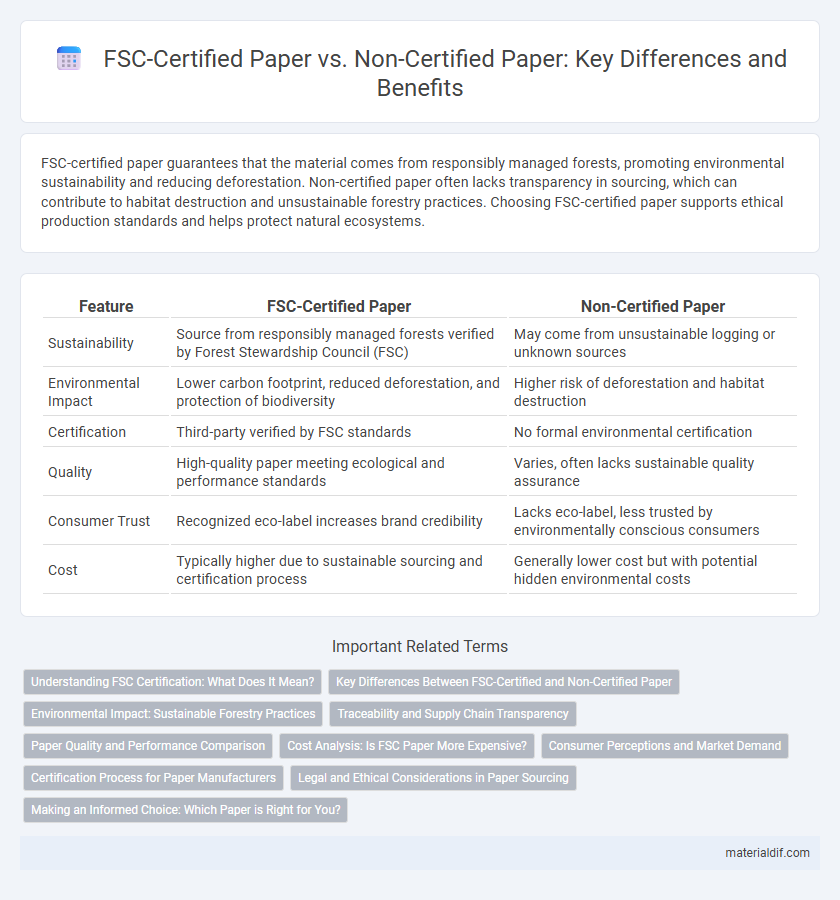FSC-certified paper guarantees that the material comes from responsibly managed forests, promoting environmental sustainability and reducing deforestation. Non-certified paper often lacks transparency in sourcing, which can contribute to habitat destruction and unsustainable forestry practices. Choosing FSC-certified paper supports ethical production standards and helps protect natural ecosystems.
Table of Comparison
| Feature | FSC-Certified Paper | Non-Certified Paper |
|---|---|---|
| Sustainability | Source from responsibly managed forests verified by Forest Stewardship Council (FSC) | May come from unsustainable logging or unknown sources |
| Environmental Impact | Lower carbon footprint, reduced deforestation, and protection of biodiversity | Higher risk of deforestation and habitat destruction |
| Certification | Third-party verified by FSC standards | No formal environmental certification |
| Quality | High-quality paper meeting ecological and performance standards | Varies, often lacks sustainable quality assurance |
| Consumer Trust | Recognized eco-label increases brand credibility | Lacks eco-label, less trusted by environmentally conscious consumers |
| Cost | Typically higher due to sustainable sourcing and certification process | Generally lower cost but with potential hidden environmental costs |
Understanding FSC Certification: What Does It Mean?
FSC certification signifies that paper products originate from responsibly managed forests meeting strict environmental, social, and economic standards established by the Forest Stewardship Council. This certification ensures sustainable forestry practices, protection of biodiversity, and respect for indigenous rights, distinguishing FSC-certified paper from non-certified alternatives. Choosing FSC-certified paper guarantees accountability and transparency in the supply chain, promoting eco-friendly consumption and supporting global forest conservation efforts.
Key Differences Between FSC-Certified and Non-Certified Paper
FSC-certified paper ensures sustainable forest management by verifying that materials come from responsibly managed forests, reducing environmental impact and promoting biodiversity. Non-certified paper often lacks transparency in sourcing practices, increasing the risk of contributing to deforestation and habitat loss. FSC certification also supports social and economic benefits for forest communities, which non-certified paper typically does not guarantee.
Environmental Impact: Sustainable Forestry Practices
FSC-certified paper ensures responsible forest management by promoting sustainable forestry practices that protect biodiversity, prevent deforestation, and maintain ecological balance. Non-certified paper often relies on wood sources from unmanaged or illegally harvested forests, contributing to habitat loss and increased carbon emissions. Choosing FSC-certified paper supports environmental stewardship and helps reduce the ecological footprint of paper production.
Traceability and Supply Chain Transparency
FSC-certified paper ensures full traceability through a rigorously audited supply chain, guaranteeing that raw materials originate from responsibly managed forests. Non-certified paper often lacks transparent sourcing, increasing the risk of environmental harm and unethical practices within the supply chain. Enhanced supply chain transparency in FSC-certified paper supports sustainable forestry and consumer trust by verifying every stage from harvest to finished product.
Paper Quality and Performance Comparison
FSC-certified paper consistently demonstrates superior quality by meeting strict environmental and sustainability standards, which ensure controlled sourcing and reduced chemical use, resulting in cleaner fibers and enhanced durability. In contrast, non-certified paper often involves less regulated production methods, potentially leading to inconsistent texture, reduced strength, and higher environmental impact. Performance tests reveal FSC-certified paper maintains better print clarity and color vibrancy, making it a preferred choice for high-quality printing needs.
Cost Analysis: Is FSC Paper More Expensive?
FSC-certified paper typically incurs higher upfront costs due to sustainable sourcing and stringent certification processes, averaging 10-20% more expensive than non-certified alternatives. However, businesses investing in FSC paper benefit from enhanced brand reputation and potential long-term savings through improved supply chain sustainability and reduced environmental impact. Non-certified paper may offer lower immediate costs but often lacks the environmental accountability and market advantages associated with FSC certification.
Consumer Perceptions and Market Demand
FSC-certified paper significantly influences consumer perceptions by aligning with growing environmental awareness and demand for sustainable products, enhancing brand trust and loyalty. Market demand for FSC-certified paper has surged as eco-conscious consumers prefer certified products, prompting businesses to prioritize responsible sourcing and supply chain transparency. Non-certified paper faces decreasing appeal due to concerns about deforestation and unsustainable practices, impacting market share and long-term competitiveness.
Certification Process for Paper Manufacturers
The FSC certification process for paper manufacturers involves rigorous auditing to ensure sustainable forest management, chain of custody integrity, and strict environmental, social, and economic standards. Manufacturers must implement traceability systems that track raw materials from certified forests through all stages of production, guaranteeing the paper's certified origin. Non-certified paper lacks this verification, potentially contributing to deforestation, loss of biodiversity, and unsustainable resource use.
Legal and Ethical Considerations in Paper Sourcing
FSC-certified paper ensures compliance with international legal standards by verifying that raw materials are sourced from responsibly managed forests, reducing risks of illegal logging and deforestation. Ethical considerations emphasize the protection of biodiversity, support for indigenous rights, and promotion of sustainable forest management practices absent in non-certified paper production. Choosing FSC-certified paper mitigates reputational risks for businesses by aligning procurement with global environmental and social responsibility commitments.
Making an Informed Choice: Which Paper is Right for You?
FSC-certified paper ensures sustainable forestry practices by verifying that the paper originates from responsibly managed forests, reducing environmental impact and supporting biodiversity. Non-certified paper, while often more affordable, may contribute to deforestation and lacks guarantees on sustainable sourcing. Choosing FSC-certified paper promotes eco-friendly purchasing decisions and aligns with corporate social responsibility goals.
FSC-Certified Paper vs Non-Certified Paper Infographic

 materialdif.com
materialdif.com